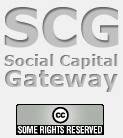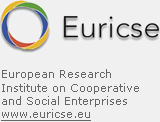Marc Hooghe is a Professor of Political Science at the Catholic University of Leuven, Fellow of the Royal Academy of Belgium, professeur invité à l'Institut d'Etudes Politiques/Université Lille-II (France) and invited professor of the Universität Darmstadt (Germany). He is a member of the expert panel of the Social Sciences Research Council of the Canadian Government. He has worked mainly on social capital, political participation and social cohesion. He has served as editor of Acta Political, International Journal of Political Science and as president of the Belgian (Flemish) Political Science Association ('Politicologisch Instituut'). He is the (co-)author of some 55 A1 articles (European Journal of Political Research, West European Politics, International Migration Review, Archives of Sexual Behavior, Political Behavior, Electoral Studies, Party Politics, International Political Science Review, etc...).
He is a member of the 'Inter-University Attraction Pole' (Pole of Excellence) on Participation and Representation (www.partirep.eu).
Studies
Ph. D. Political Science (Brussels, 1997); Ph. D. Sociology (Rotterdam, 2002); M.A. Contemporary History (Ghent, 1987); M.A. Human Ecology (Brussels, 1991).
Research interests
Main research interests: political participation, social movements,social capital, gender and participation, political socialisation, social cohesion
Recent publications (selection)
Marc Hooghe & Kris Deschouwer (2011). Veto Players and Electoral Reform in Belgium. West European Politics, 34(3), 2011, accepted.
Marc Hooghe (2011). I'm Happy; Hope You're Happy Too. Examining the Different Dynamics of Individual Subjective Well-Being and View on Society. Journal of Happiness Studies, 12, accepted.
Marc Hooghe (2011). Is Sexual Well-Being Part of Subjective Well-Being? An Empirical Analysis of Belgian (Flemish) Survey Data using an Extended Well-Being Scale. Journal of Sex Research, 48, 2011, accepted.
Marc Hooghe, Sofie Marien & Teun Pauwels (2011). Where do Distrusting Voters Turn to if there is no Viable Exit or Voice Option? The Impact of Political Trust on Electoral Behaviour in the Belgian regional Elections of June 2009. Government and Opposition. International Journal of Comparative Politics, 46(2), 2011, accepted.
Marc Hooghe & Bram Vanhoutte (2011). Subjective Well-Being and Social Capital in Belgian Communities. The Impact of Community Characteristics on Subjective Well-Being Indicators in Belgium. Social Indicators Research, 100(1), accepted.
Marc Hooghe (2011). The Impact of Gendered Friendship Patterns on the Prevalence of Homophobia among Belgian Late Adolescents. Archives of Sexual Behavior, 40, accepted.
Ellen Quintelier & Marc Hooghe (2011). Television and Political Participation Among Adolescents. The Impact of Television Viewing, Entertainment and Information Preferences. Mass Communication and Society, 14, 2011, accepted.
Peter Thisted Dinesen & Marc Hooghe (2010). When in Rome, do as the Romans Do. The Acculturation of Generalized Trust among Immigrants in Europe. International Migration Review, 44, 2010, accepted.
Claes Ellen, Hooghe Marc, Reeskens Tim (2009) Truancy as a Contextual and School-related Problem. A Comparative Multilevel analysis of Country and School Characteristics on Civic Knowledge among 14 year olds. Educational Studies, 35(2) pp. 123-142.
Marc Hooghe, Tim Reeskens, Dietlind Stolle & Ann Trappers (2009). Ethnic Diversity and Generalized Trust in Europe. A Cross-National Comparative Study. Comparative Political Studies, 42(2), 198-223.
Thomas Gschwend & Marc Hooghe (2008). Should I Stay or Should I Go? An Experimental Study on Voter Responses to Pre-Electoral Coalitions in Flanders (Belgium). European Journal for Political Research, 47(5), 537-555
Marc Hooghe (2008). Condorcet, Marie Jean Antoine Nicolas de Caritat, Marquis de Condorcet, in International Encyclopedia of Political Science. Washington, D.C.: CQ Press.
Marc Hooghe & Britt Wilkeg Adults in Eight Countries. Journal of Youth and Adolescence, 37(2), 155-167.
Tim Reeskens & Marc Hooghe (2008). Cross-Cultural Measurement Equivalence of Generalized Trust. Evidence from the European Social Survey, 2002 and 2004. Social Indicators Research, 85(3), 515-532.
Marc Hooghe, Voluntary Associations and Socialization, in Dario Castiglione, Jan Van Deth & Guglielmo Wolleb (eds., 2008). Handbook of Social Capital. Oxford: Oxford University Press.
Marc Hooghe, Ann Trappers, Bart Meuleman & Tim Reeskens (2008). Migration to European Countries. A Structural Explanation of Patterns, 1980-2004. International Migration Review, 42(2), 476-504.
Marc Hooghe & Wouter Teepe (2007). Party Profiles on the Web. An Analysis of the Logfiles of Nonpartisan Interactive Political Internet Sites in the 2003 and 2004 Election Campaigns in Belgium. New Media & Society, 9(6), 965-985.
Marc Hooghe & Tim Reeskens (2007). Are Cross-National Surveys the Best Way to study the Extreme-Right vote in Europe? Patterns of Prejudice, 41(2), 177-196.
Marc Hooghe (2007). Social Capital and Diversity. Generalized Trust, Social Cohesion and Regimes of Diversity. Canadian Journal of Political Science/Revue canadienne de science politique, 41, in press.
Marc Hooghe & Yves Dejaeghere (2007). Does the 'monitorial citizen' exist? An Empirical Investigation into the Occurrence of Postmodern Forms of Citizenship in the Nordic Countries. Scandinavian Political Studies, 30(2), 247-269.
Marc Hooghe (2007). Ethnocentrism. In: International Encyclopedia of the Social Sciences, MacMillan Reference, Philadelphia.
Marc Hooghe, Ellen Quintelier & Tim Reeskens (2006). How Political is the Personal? Gender Differences in the Level and the Structure of Political Knowledge. Journal of Women, Politics and Policy, 28(2), in press.
M. Hooghe, B. Maddens & J. Noppe (2006).Why parties adapt: Electoral reform, Party Finance and Party Strategy in Belgium. Electoral Studies, 25(2), 351-368.
M. Hooghe & T. Reeskens (2006). Kerkelijke betrokkenheid, vertrouwen en etnocentrisme. Een vergelijkende studie onder christelijke gelovigen in Europa. Tijdschrift voor Sociologie, 27(3), 263-284.
D. Stolle & M. Hooghe (2005).Inaccurate, Exceptional, One-Sided or Irrelevant? The debate about the alleged decline of social capital
and civic engagement in Western societies. British Journal of Political Science, 35(1), 149-167.
M. Hooghe (2005). Divided by the Same Language. Political Science Associations in Belgium and the Netherlands. European Political Science, 4(2), 141-150.
D. Stolle, M. Hooghe & M. Micheletti (2005). Politics in the Supermarket. Political Consumerism as a Form of Political Participation. International
Political Science Review, 26(3), 245-269.
Hooghe, M. (2005). Ethnic Organisations and Social Movement Theory: the Political Opportunity Structure for Ethnic Mobilisation in Flanders. Journal of Ethnic and Migration Studies, 31(5), 975-990.
M. Hooghe (2003). Value Congruence and Convergence within Voluntary Associations: Ethnocentrism in Belgian Organizations. Political Behavior, 25(2), 151-176.
M. Hooghe & D. Stolle (2004, eds.), Youth, Politics, and Socialization. Special Issue of 'Acta Politica', 39(4), pp. 330-443.
M. Hooghe (2004), Political Socialization and the Future of Politics, Acta Politica, 39(4), 331-341.
D. Stolle & M. Hooghe (2004), The Roots of Social Capital. Attitudinal and Network Mechanisms in the Relation betweenYouth and Adult Indicators of Social Capital, Acta Politica, 39(4), 422-441.
D. Stolle & M. Hooghe (2004), Consumers as Politicl Participants? Shifts in PoliticalAction Repertoires in Western Societies, pp. 265-288 in M. Micheletti, A. Føllesdal & D.Stolle (eds.), Politics, Products, and Markets. Exploring PoliticalConsumerism Past and Present. Transaction Press, New Brunswick.
M. Hooghe,D. Stolle & P. Stouthuysen (2004). Head Start in Politics. The Recruitment Function of Youth Organizations of Political Parties in Flanders (Belgium), Party Politics, 10(2), 193-212.
L. Stevens & M. Hooghe (2003), The Swing of the Pendulum. The Detraditionalisation of the Regulation of Sexuality and Intimacy in Belgium, 1973-2003, International Journal of the Sociology of Law, 31(2), 131-151.
M. Hooghe (2003), Participation in Voluntary Associations and Value Indicators. The Effect of Current and Previous Participation Experiences, Nonprofit and Voluntary Sector Quarterly, 32(1), 47-69.
M. Hooghe (2003), Electoral Reform in Belgium: Proportionality or Mediated Politics? Representation. Journal of Representative Democracy, 39(4), 264-269.
M. Hooghe, J. Noppe & B. Maddens (2003). The Effect of Electoral Reform on the Belgian Election Results of 18 May 2003, Representation. Journal of Representative Democracy, 39(4), 270-276.
M. Hooghe (2003), Why Should we be Bowling Alone? Cross-Sectional Results from a Belgian Survey on Civic Participation, Voluntas. International Journal of Voluntary and Nonprofit Organizations, 14(1), 41-59.
D. Stolle & M. Hooghe, Conflicting Approaches to the Study of Social Capital. Competing Explanations for Causes and Effects of Social Capital, Ethical Perspectives, 10(1), 22-45.
M. Baetens & M. Hooghe (2004), Alternatieve consumptie als een vorm van politieke participatie? Een onderzoek bij de leden van Voedselteams Vlaanderen, Res Publica, 46(1), 33-55.
M. Hooghe (2002), Watching Television and Civic Engagement. Disentangling the Effects of Time, Programs, and Stations, Harvard International Journal of Press/Politics, 7(2), 84-104.
M. Hooghe & G. Deneckere, Op het elan van de democratie. Emoties als mobilisatiefactor in de Belgische politieke geschiedenis, Res Publica, 44(1), 97-117.
M. Hooghe (2001), Belgien: Stabilität und Wandel neokorporatistischer Interessenvermittlung, pp.31-50 in Werner Reutter & Peter Rütters
Most recent books
M. Hooghe, K. De Swert & S.Walgrave (eds.), Nieuws op televisie. Televisienieuws als venster op de wereld. Acco, Leuven 2005, 237p. (Res Publica Bibliotheek, vol. 3).
K. Deschouwer & M. Hooghe. Politiek. Een inleiding op de politieke wetenschappen. Boom, Amsterdam 2005, 299p.
M. Hooghe & J. Billiet (eds.), Historische en sociologische benaderingen van nieuwe sociale bewegingen. ODISEA, Gent-Leuven, 2004, 238p.
M. Hooghe, Sociaal kapitaal in Vlaanderen. Verenigingen en democratische politieke cultuur. Amsterdam: Amsterdam University Press, 2003.
M. Hooghe & Dietlind Stolle (eds.): Generating Social Capital. Civil Society and Instititutions in Comparative Perspective, Palgrave, New York 2003.
Other responsibilities
Co-Organizer 'Social Science Seminars' on Civil Society for the Royal Dutch Academy of Sciences, with P. Dekker (Tilburg) (www.knaw.nl/swr)
Editor Acta Politica (www.palgrave-journals.com/ap).
President, Belgian Political Science Association (www.politologischinstituut.be)
Principal Investigator, Social Cohesion project (www.socialcohesion.eu)
Past-editor Tijdschrijft voor Sociologie (www.sociologie.be) and
Res Publica (www.respublica.be)
Chair, Electronic News Archive Belgium (www.nieuwsarchief.be)








